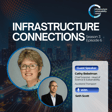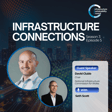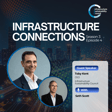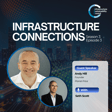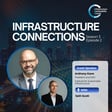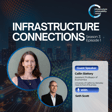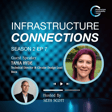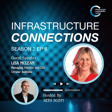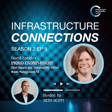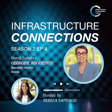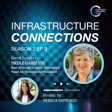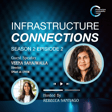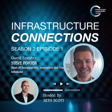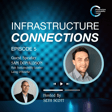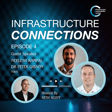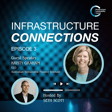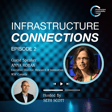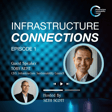Become a Creator today!Start creating today - Share your story with the world!
Start for free
00:00:00
00:00:01

Episode 6 - Equity and Culture w/ Dr Sina Cotter Tait
Guest Speaker Dr Sina Cotter Tait discusses the practice of equity and culture in infrastructure. From her vantage point as Director for the Infrastructure Commission, we investigated the role these will play in the future pipeline of sustainable infrastructure.
Transcript
Introduction to Infrastructure Connections
00:00:00
Speaker
infrastructures for people and by people, it kind of makes sense um to involve people who are going to end up using it and operating it and having to deal with it.
00:00:18
Speaker
Welcome back to Infrastructure Connections, the podcast where we explore what makes sustainable infrastructure work. Brought to you by the Infrastructure Sustainability Council. I'm your host,
Guest Introduction: Dr. Sina Cotter-Tate
00:00:28
Speaker
Seth Scott, and today we'll be speaking about equity and culture with our guest, Dr. Sina Cotter-Tate.
00:00:34
Speaker
Take a deep breath for this one. Sina is a civil engineer and director at Collective Success, an engineering and procurement firm located in New Zealand. Formerly a member of the Engineering New Zealand Governing Board, she currently serves in a governance capacity for several infrastructure-related agencies.
00:00:51
Speaker
She's currently serving on the boards of Whitestone Contracting, Kiwi Rail Holdings, Engineering New Zealand, as well as many, many others. Sina, welcome to the show. Thank you. ah Researching your background, there so many interesting questions to explore, but my first question is, how do you do
Balancing Multiple Roles
00:01:08
Speaker
it all? Because in the time it takes me to take the recycling to the curb, it seems like you've been in three board meetings.
00:01:15
Speaker
um I don't actually do that much. see it's It's like anybody. ah i just done I'm just really old. And so there's a bunch of stuff in my CV. But they're all to present. so Well, yes, so I am juggling. But what one thing that's kind of worked in my favor is that I've never worked full time.
00:01:34
Speaker
So I became a parent while I was at university and I've always been a part time um sort of student and part-time employee. And so that kind of allows you to do more than one thing at a time. um I don't know that that's always evident from my CV. um And
Sense of Purpose in Work
00:01:48
Speaker
the yeah other thing um is that for me, I think if you get a strong sense of purpose in your work, you know, and if you you were clear about how the work that you're doing is helping to build the legacy that you want to leave, I think that just, you get really enthusiastic about doing work and and taking lots of opportunities as they come up.
00:02:07
Speaker
um So i think I feel like I've been really lucky in my career and that I've had lots of opportunities to do some things that are a little bit different, maybe lead to other ah opportunities that I've been able to take up too. um But it's all kind of centered around the kind of work I want to do, the kind of people I want to work with, and the kind of impact I want to leave.
00:02:25
Speaker
That's a fantastic attitude to have. Thanks. So you've been a civil civil engineer and an engineer to contract for a long time. How did that transition into equity and culture?
Community Input in Projects
00:02:38
Speaker
It's a really good question because it's not something that you talk about when you're ah when you're training to be an engineer. It's certainly not something that's evident in the engineer to contract role, right? um And yet when you live in New Zealand you and you're delivering infrastructure projects, you are working with people.
00:02:54
Speaker
um And some of those projects for me, you know, I'm working out in the community with, you know, for instance, a Māori community on Māori land, developing a sewerage scheme to service them. it just kind of makes sense. Why wouldn't you involve the people who are going to be the end users of the infrastructure?
00:03:10
Speaker
Why can't they be involved in the decision making and influence the outcome of that infrastructure, which is ultimately for them? and So even though it's not something that we are encouraged or formally trained in, it sort of becomes evident as you do your work.
00:03:26
Speaker
yeah Infrastructures for people and by people, it kind of makes sense um to involve people who are going to end up using it and operating it and having to deal with it um at the very earliest stages.
00:03:40
Speaker
So that's kind of how I became aware of it, I suppose. And this is a good time to have you on the show because those kinds of attitudes have that come under question lately. I don't think anybody really believes it's going away. It's all political theater, but we do have to work harder to tell that story. So what do you think? Why do
Diversity Beyond Demographics
00:03:58
Speaker
you think there is a recent push against diversity and why won't this change our diversity efforts?
00:04:04
Speaker
Um, i don't know, it's sort of hard for me to talk about this stuff ah because it always always sounds quite self-serving when I talk about the pros and of diversity. I guess I'd start by saying I see diversity as as a very inclusive term. It's not just demographic diversity, it's diversity of thought, diversity of lived experience.
00:04:22
Speaker
um And it's basically embracing difference and understanding the value that different perspectives and in different kind of ways of understanding the world can enhance the infrastructure outcomes on the way that we come up with.
00:04:36
Speaker
I think it's probably something that is changing in our industry, albeit slowly, and change makes people uncomfortable sometimes. um And, ah you know, all you have to do in terms of the the second part of your question to think about why it's not going to go away, our demographics are changing.
00:04:53
Speaker
So the very nature of our workforce and the very nature of the people that we work with. is changing as well. We're going to have get used to working with a more diverse range of people, you know, whether we're comfortable with it or not.
00:05:07
Speaker
I think what makes you a go-to expert in this field is really just that you've made such a great impact in the area. You you care very deeply about the culture and social change involved in infrastructure. So
Economic Opportunities for Communities
00:05:19
Speaker
um since most people think of infrastructure as the built environment, where do you see infrastructure making these intangible impacts on social and cultural issues?
00:05:29
Speaker
um The big one that I see, and it's you can probably, if you've picked up any anything I've publicly said or or written, the the big one is that infrastructure is, there's economic opportunity in delivering infrastructure and in maintaining it. and And I think that economic opportunity is, you know, there's opportunities to share that across a wider set of people.
00:05:50
Speaker
um So I think if you look at the work that Amutai is doing, trying to bring try to create connections with Māori and Pasifika-owned businesses um to construction work, that is ah kind of an example of trying to bring that economic opportunity to people who, you know, there there are barriers for some of those businesses and trying to access those. um And I guess the sense of agency, people sort of feeling a sense of ownership over the infrastructure that they benefit for and actually they pay for.
00:06:18
Speaker
So rather than having something done to you, actually being part of of building a solution for yourself and your community, I think that's really important. For me, you know, ah Probably the the career highlight for me um over my many years in the industry was after the category earthquakes. um I had the chance, I guess, as an engineer to be involved in the emergency response and also the the recovery.
00:06:42
Speaker
And to be able to use your skills and and be part of um rebuilding your own community, it was incredibly powerful. And that's kind of an opportunity that I think should be available to a wider set of people, not just a narrow set of contractors and suppliers.
00:06:57
Speaker
You did start with an MBA from the University of
Workforce Demographics and Challenges
00:07:00
Speaker
Canterbury. How do you frame the business case for this diversity and has anyone quantified the dollar values around it? For me, the business case the business case argument comes in in a very pragmatic sense. Our workforce is changing, right?
00:07:13
Speaker
The demographics of New Zealand, of Aotearoa, are changing. think the Māori is expected to make up around 30% of the workforce in 20 to 30 years' time. Pacifica are also a very rapidly growing proportion of our workforce.
00:07:28
Speaker
of our population. And so that has implications for workforce, for the leadership in the and the workforce. It also has implications for your customer base and the kind of cultural values that businesses will need to have.
00:07:39
Speaker
So if you look at it from that point of view, I think the business case is clear. If your customer market's changing, if your workforce pool is changing, you're going to need to to change with it or you're going to be left behind.
00:07:51
Speaker
Yeah, absolutely. And I know part of that is just training up the workforce to take different roles as well. I see yeah one of the things we hear a lot about bright recently is the importance of a pipeline, not just for the economic prosperity, but for the continuity of professional learning and advancement and keeping people in the industry and keeping them from moving to Australia.
00:08:10
Speaker
So what we have a lot of Australian listeners. and What are the challenges you see during this quiet period in the industry and how can the industry retain that great talent while where our pipeline is down?
00:08:23
Speaker
i mean, it's a tough time in New Zealand at the moment. While we are in a bit of a pause and it's tough on the industry, I have to say. It's tough on on engineers, it's tough on on contractors too. We're just sort of waiting for that work to pick up.
00:08:35
Speaker
What I'm seeing is that we're, you know, I'm a director of a construction company down here. We're seeing this as a time to really um invest in the training and the preparation for growth of our people.
00:08:47
Speaker
um That's really all you can do is is really um hunker down, try and look after your people, try and train, use ah the opportunity to embed and build some of those internal systems but that you don't get to when you're when you're really busy actually doing work and just sort of prepare for the work that we know needs to be done.
00:09:05
Speaker
um um ah I might be a bit off brand here, but I don't personally, you know, I've lived in in Australia. I haven't worked there myself, but my second son was born there. um And I see a lot of advantages in people going offshore and experiencing, you know, um a different workforce in a different country, different sets of rules and and regulations, different workplace cultures, and then bringing some of that knowledge back to New Zealand.
00:09:27
Speaker
I don't even think that that's a bad thing. I'm quite open-minded when it comes to people leaving. If it's temporary and you need to go overseas and pay the mortgage, that's cool. If you come back and you bring knowledge and stuff that you've gained from and from the Aussies who do things probably a bit differently um to how we do it in New Zealand, that's got to be good for us too.
00:09:46
Speaker
yeah Absolutely. Internationally as well. I mean, I come from the US and I feel like I also bring something different to the table when I'm involved in projects. Yeah. Absolutely. And I think that that broadening that worldview is always going to be a benefit to the project, to the nation, to the person involved.
00:10:04
Speaker
Yeah. Yeah, I do too. I do too. don't think we should be trying tracking people here. I think we should embrace movements and exchange of ideas. So you mentioned that um starting this talent pipeline can extend right into childhood and early education, especially with that emphasis on maths and science to drive people into an engineering degree. How is that critical to developing engineers later in life?
Education and Scholarship Gaps
00:10:28
Speaker
it's It's a narrow entry, formal entry to engineering in New Zealand, which requires a certain level of formal education in the secondary system, which in turn relies on the primary system. and it's And it's difficult to change those institutional requirements from tertiary and training organisations.
00:10:47
Speaker
I don't think we ever a will because there are international and you know benchmarking measures that we have to line up with. if we want to grow the pipeline of engineers and scientists, actually, because it's more than just engineers, it's project managers, it's planners, it's scientists, ah we we must ah grow the capacity of the pipeline upstream um of those tertiary institutions, which would be a really good thing for New Zealand.
00:11:11
Speaker
um We have... And this is hopefully not too provocative, but I think in New Zealand we have a very unambitious curriculum in our primary education system, um particularly for maths and science.
00:11:25
Speaker
You know, 80% of children when they come to secondary school have never done science. Not really. they They might have done a project on spiders, but that's not science. They won't have done classical mechanics. They would have done sort of basic concepts of science.
00:11:38
Speaker
of science as we understand it. And numeracy is is good, but it is no substitute for early concept mathematics. um And so they're sort of we're almost putting our kids on the back foot before they get into the secondary system.
00:11:51
Speaker
And the secondary system that you know very quickly filters kids for maths and science, very quickly. um And by the time they get to university, it's a very narrow filtered set of students who are able to enter tertiary study for engineering, science, and those kind of those those higher qualifications that we need for our industry.
00:12:09
Speaker
So I think, you know, there's a number of factors that underline that, but um addressing that pipeline is probably really important for our economic future. And then that carries right through to university as well. I understand um you sponsor a scholarship for Maori and Pacifica engineering students.
00:12:26
Speaker
What's the uptake in those communities and what's the challenges that they face getting into an engineering career or an infrastructure field? Well, it sounds like a very strongly equity-based scholarship, and and it is intended that way.
00:12:40
Speaker
What I have found is that um i mean the the applicants are normally get about sort of six to to eight per year. This year, I have 10 applicants, um which is not many, considering that there are around 700 students and enrolled in engineering at Canterbury.
00:12:55
Speaker
um
00:12:58
Speaker
The students who tend to apply, and I say tend to to because it's not not all of them, tend to to be students who have whakapapa Māori or Pasifika ancestry, but who have benefited from middle-class upbringings and um and wealthy schools.
00:13:13
Speaker
um Having said that, there have been a few recipients of the scholarship who have had a really tough time, and and they are the ones that the scholarship is intended to to really support and uplift. ah So what one of them was a um young man who dropped out of school from Tokoroa up north, dropped out of school at 16, only decided to enroll in university when he became a father, ah teenage father.
00:13:37
Speaker
um And he's had a you know he's he's had a difficult journey to get to where he is, but he's worked incredibly hard and shown you know the kind of grit and determination that will make him a fine engineer and leader one day. So that but those examples are probably the exception rather than the rule for the scholarship.
Local Spending and Government Initiatives
00:13:52
Speaker
But, you know, I'm hopeful that um we all bring our identities into engineering in different ways.
00:13:59
Speaker
Some of us will be coming from certain backgrounds which have a bit more privilege than others, and some are a bit more kind of outward with their with their Indigenous identity than others. But but that's OK. You know, we are an inclusive group.
00:14:12
Speaker
Yeah, it's a great way to look at it. Absolutely. So yeah um you do provide consulting advice on purchasing. That's one of the major areas that you consult on. and The City Rail Link recently posted results that allocated 7% of their budget to Mauri and Pacifica-owned subcontractors and suppliers.
00:14:29
Speaker
And we know this helps increase competition among suppliers, um ultimately leading to competitive pricing overall. So tell us what you're seeing as a result of the shift to local spending and why that's important.
00:14:42
Speaker
I reckon in the last probably eight years, I've seen a real uplift in the visibility um and the engagement of Pasifika and Māori businesses, um as well as employees in terms of skilled trades and pathways into the industry.
00:14:57
Speaker
um Perhaps it's partly been driven by government initiative and in government agency interests, and really making those pathways available to people, but I have seen a material difference, I believe. I'm part of a workforce development council and for Pacific people involved in the construction sector,
00:15:16
Speaker
And that's certainly a group that's providing a bit of energy and momentum around trying to and maintain these pathways to big projects for employees you know who might otherwise sort of struggle um to access this kind of work.
00:15:29
Speaker
I reckon it's really positive. and And I think the people that I've spoken to, what one of the leaders at City Rail Link, who's no longer there, talked to me with the personal um passion he felt for that work and the personal fulfilment that he takes you know from creating those opportunities for those people.
00:15:46
Speaker
um And that's a really powerful thing too, I think. yeah We've definitely seen that uptake in our projects as well. Yeah. And and one of them that's making big headway is the company Amatai, helping organizations employ Maori and Pacifica people and businesses.
00:16:01
Speaker
um How did you get involved with
Bridging Procurement Gaps
00:16:03
Speaker
them? And more importantly, is that a model that you think could be replicated overseas? ah Yes, is the short answer to the second part of your question. How I got involved with them was um they called me one day after i think I A group of colleagues and I published a piece online around how we would like to see Māori and Pasifika form a well, perspectives and economic opportunity form part of the COVID infrastructure-led recovery.
00:16:33
Speaker
And and ah then I had a call from Amatai saying, oh, interested that that you're in the space, would like to talk to you around sort of providing some procurement training ah for some of our businesses. And and that's kind of how i I got to work with them.
00:16:47
Speaker
And what i what I saw was a group of people really passionate about trying to bridge that gap that we have in infrastructure between procurement requirements and supplier capability. Because, you know, at the moment we've got, ah when agencies give out work, they've got procurement requirements that are onerous, you know, in terms of the admin that you you have to you have to prepare shiny bids, you know, with a lot of written content and pictures. And it takes quite a lot of time and um and resource to do that. And it tends to favour the big companies because they are the ones who have the capability, the people, the resource to actually do that.
00:17:21
Speaker
For smaller organisations, particularly ones who are really good at building, but maybe not so good at writing and presenting, it's a real disadvantage. And what I saw was Amaltois sort of trying to step into that gap and helping people helping connect buyers with sellers.
00:17:35
Speaker
um Because at the end of the day, that's what buyers want. They want people who are good at delivering infrastructure. They don't necessarily care if you're good at writing a bit or not. And yet... The only way they can demonstrate value for money when they're rewarding public funds is is through this written bid process.
00:17:49
Speaker
So, yeah, I think agencies like Kamatai stepping into that space is, unfortunately for New Zealand, really critical, like really necessary until we change our procurement approach.
00:18:02
Speaker
And I think that's the value of diversity, really, is trying to incorporate those different approaches. um One of the approaches that you'd mentioned was that you wanted to see a shift in Indigenous, and including Indigenous values around collectivism rather than just being focused on technical skills.
00:18:17
Speaker
What does that look like?
Collective Approaches in Engineering
00:18:20
Speaker
ah Well, I mean, that was probably part of a broader conversation that I'm if If people know me, they know I get in my soapbox around this. But it's and in our industry, we are particularly good at picking people based on their CV and their technical skills.
00:18:34
Speaker
um But if you speak to anyone in the industry who's who's delivered really good work, and they will tell you the most important things to manage are relationships with other people. And when I've spoken to people who are good at doing that, they they very much sort of take this collectivist approach to delivering big projects. So they think about the end user, they they think about and the people involved all along the way.
00:18:57
Speaker
And that's kind of kind of what I mean, that sort of worldview of thinking about the outcomes for the people who are going to benefit from the work that you're doing. that That's sort of what I was trying to get at with that statement, I suppose.
00:19:08
Speaker
and yeah Yeah, taking a wider view than just um budget and programme, I suppose. And certainly taking a wider view than just your somebody's qualifications.
00:19:20
Speaker
I'm actually yeah trying to understand and it if we appointed people sort of um not just on their technical merits, but also recognise other aspects of merits, such as their ability to relate to other people, ah their ability to establish a really good sense of purpose in a project team. um i think I think we would see a real ah uplift in performance.
00:19:43
Speaker
That is so important. I totally agree with that. I've seen organizations where when they have a new technical skill that they need filled, they'll go out and look at the market rather than look at their existing employees and see how they might be able to fulfill that with their own talents. It's absolutely true. It's a great point.
Diversity Agenda Accord
00:20:02
Speaker
Tell us about the Diversity Agenda Accord. How did that start and how are you involved in that? The you know the purpose of it is to try and and is to really try and uplift the number of diverse leaders within our industry.
00:20:17
Speaker
and I think the initial focus was very much on women, but of course that's broadened to a wider sort of definition of diversity now as well. um it's It's an important agency from my experience in participating in ah events. It's sort of it's a become a forum which is very much needed and valued.
00:20:37
Speaker
by people as a place to go and you don't necessarily feel that you belong at some of the more traditional events and forums. um It's a place for people to go and you know get resources, ideas, share experiences around what it's like to be in the industry and and where i think opportunities might lie.
00:20:54
Speaker
In a lot of ways, it can become ah a generational change and it takes a very long period of time. And that might be slow and lack clear signs of advancement. Like previously, you mentioned that over the last seven years, you've seen a lot of things change, but seven years can feel like a long time to an individual who's trying to make an advance in the industry.
00:21:12
Speaker
um A student you inspired today might not be a CEO or on a board until 20 years from now. So how do you personally endure that slow pace of change and how do you help others not to be discouraged by it?
Finding Purpose in Work
00:21:25
Speaker
Part of the problem with being impatient for change is that you inherently compare yourself to others, right? And sort of where they're at on on the same journey. And that's a mistake. that's That's a false comparison to make. I think you're better to look at the kind of ah work that you want to do on a daily basis and realise that you can't separate your identity from the work that you do.
00:21:48
Speaker
and And to really focus on enjoying and finding a sense of purpose in and your job today is probably the best path. I'm a firm believer that if you enjoy what you're doing today and you look for the opportunities and to do the best work that you can, other opportunities will will open up when the time is ready.
00:22:09
Speaker
ah when the time is right, I should say. And um I don't know, i think I think it would be a real shame if somebody was spending 20 years trying to, waiting for that CEO role and in the meantime hadn't enjoyed the 20 years of time they'd spent in the industry because all we've got is time, right? And the CEO is role isn't all it's cracked up to be. um it It sort of goes back to your priorities, being really clear on what your priorities are for your life.
00:22:34
Speaker
And I think the You do your best work when you are feeling fulfilled and when you are feeling a sense of purpose. And when you're doing your best work, that's when the opportunities are most likely and to come your way.
00:22:46
Speaker
um Whatever those opportunities are, it's really up to you. It does really depends on your idea of what success I know for many people, success is... CEO role, it was never that for me. and for you know Other people have different definitions of success.
00:23:02
Speaker
So I think it's helpful to sit down and and think about um what you regard what you would regard as a successful life for yourself and and look at your sort of work backwards, back engineer it ah if you like, to where you are today and figure out what you want to you know what what you want your work trajectory to look like.
00:23:22
Speaker
One of the things we had to do when I was doing an MBA is we had to write our own ah obituary, which was um and intensely valuable, you know, to spend an hour writing what what it is that you hope your children and your friends would say about you really focuses you on what is important to you and your life.
00:23:43
Speaker
And i found that i found that fundamentally useful to understand what I wanted to do with my time. And I think that's really helpful for anyone. You must have needed more than an hour to talk about it based on the qualifications you have now. I only got a couple. but
00:24:03
Speaker
Well, the good news is that we are seeing that advancement and it is happening. And even with the recent setbacks and political discussions, I think it's inevitable that it's going to continue forward. um What are some of the innovations you see in infrastructure that excite you right now in terms of cultural impact? And
Māori Values in Engineering
00:24:19
Speaker
where do you see ah equity and diversity changing infrastructure in the next 10 to 20 years?
00:24:24
Speaker
and Probably one of the most um exciting shifts I've seen is in the water engineering space, the water infrastructure space of the last few years. The embrace of Maori indigenous values into all aspects of water engineering has been quite eye-opening for me to see.
00:24:45
Speaker
I've been 20-something years in this industry and it started off um as being very much about pipes and pumps. And now we are talking about nature-based solutions, low-impact solutions, working together with iwi communities to develop sustainable, long-term, low-impact solutions that are much better, much cheaper, just just better and in every sort of sense.
00:25:11
Speaker
And I think that's ah that's a transition. in one part, one small part of the infrastructure sector, that needs to happen across other sectors as well. I think we'll also have liked, mean, the Christchurch earthquake rebuild has sort of provided an example of expressions of cultural identity through rebuilding.
00:25:31
Speaker
ah So you'll see, I know you've been to Christchurch, you'll see a lot of our buildings now and have you know highly visible Maori ah decorative elements on them. And if you look a bit closer, some of the some of our best buildings have actually got a highly um highly expressed Maori um what's the word im looking for character in them.
00:25:51
Speaker
So there is, you know, the the New Justice Precinct, for example, has a kōra wai on the outside of it, and that represents ah the, I guess, the aspiration of Maori for it to be, like, not a place of punishment and correction, but a you know a place of punishment of
00:26:10
Speaker
where you're having care wrapped around you, right, and and to try and rebalance a sense of justice. So that that kind of thing is is quite exciting to me as well. and And I think the most exciting thing to me has been the embraces that by non-Mauri people who've learnt a lot, who have, you know, who've really been touched by and by learning something new and by um and by the meaningfulness it has for people.
00:26:34
Speaker
So. Yeah, those are probably um two innovations. And the third one I think of, it's not really an innovation, but have you heard of SiteSafe? Yes. Yeah, so I mean, that's that's kind of an industry-led Kaupapa, right? And they lean very heavily on on the mana of their Māori and Pacific leaders to try and bring about a culture change in the sector. So it's ah it's not a built solution, it's more a culture kind of initiative, but I think that is a really interesting kaupapa that other parts of the sector could really look to.
00:27:08
Speaker
so over your long career, what has been the most intractable challenge? What's the one thing that you continue to have to deal with and how are you working to overcome it? In the industry.
00:27:20
Speaker
she it's Not you personally, it's okay.
00:27:24
Speaker
So
Personal Priorities and Inclusivity
00:27:25
Speaker
many challenges. We all procrastinate, it's okay. Yeah, I do a lot of that. um I think, I mean, there's just so many opportunities, right? There's so many problems, which is so many opportunities to do things, to get involved.
00:27:38
Speaker
And that's probably my my biggest um challenge is saying no to stuff because there's so much that's interesting. There's so many cool people I want to work with and learn from. um I think and another thing, and I sort of alluded to it before, is that really persistent sense of comparison culture that we have.
00:27:55
Speaker
I don't think it's just our industry. I think everyone has this. You can't help but sort of compare yourself to your peers you know and sort of you know wonder about how well you're doing. and But it's stupid. That's such a mistake to make. if you' get we're not We're not in a race, right? We're all working together and we're all walking our own paths and our own journeys.
00:28:15
Speaker
um And it's something that, you know, I have to remind myself of now and then that, um you know, I might not, I might not be doing what such and such is doing, but that's okay. I'm happy with where I am and I'm happy with where I'm going and what I've done.
00:28:27
Speaker
So I think that's, um that's probably one of the big things. And it's, yeah, for me, it's about priorities and legacy because it's, yeah, it's not a race. It's your life and your everyday counts.
00:28:38
Speaker
That's excellent. Well, what do you think one of the things that, what is one thing that you think our listeners could do to um help promote equity and diversity in the workplace?
00:28:51
Speaker
ah Well, I mean, the what I usually say to people is hire more diverse people. It's really hard to be, you know, just, I mean, everyone, most people have some experience of this and in one form another. It's hard to be the one who's different in the office if there's only one here.
00:29:08
Speaker
And so the more people we have with the more kind of differences, the more we'll all be different. And the easier it'll be to not feel what so feel like you belong, but also not have to struggle with feeling like you don't belong.
00:29:22
Speaker
I really like that. Well, thank you so much for speaking with us. We really appreciate it. You're very welcome, Sue. Thank you very much for the invitation. And um I look forward to tuning into your podcast in future.
00:29:35
Speaker
Thank you for listening to Season 1 of Infrastructure Connections. Please take a moment to follow us wherever you get your podcasts, and we want your feedback. Drop us a line to let us know what you think.
00:29:45
Speaker
Stay tuned for Season 2 of Infrastructure Connections.
